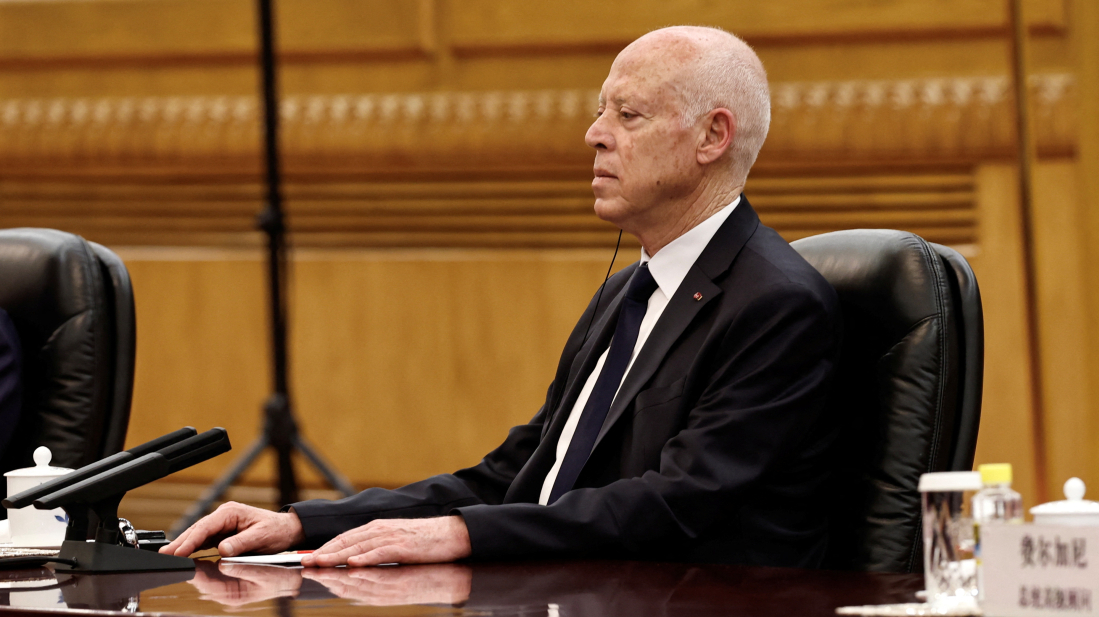live Middle East conflict: Key developments on Wednesday as U.S. submarine sinks Iranian warship
A torpedo from a U.S. submarine sunk an Iranian warship off the coast of Sri Lanka, U.S. Secretary of Defense, Pete Hegseth told reporters as ...

A Tunisian court has handed down a death sentence to a 51-year-old man over Facebook posts deemed insulting to President Kais Saied and threatening to state security, his lawyer confirmed on Friday.
A Tunisian court has handed down a death sentence to a 51-year-old man over Facebook posts deemed insulting to President Kais Saied and threatening to state security, his lawyer confirmed on Friday.
Saber Chouchen was convicted earlier this week on charges of attempting to overthrow the state, insulting the president and spreading false information online. Judges said his posts incited violence and chaos, citing Tunisia’s penal code and the 2022 cybercrime legislation known as Decree 54.
The ruling marks the first time such a penalty has been applied in Tunisia for social media activity. While capital punishment remains legal, the country has not carried out an execution since 1991, when a convicted murderer was put to death.
Chouchen’s lawyer, Oussama Bouthelja, said his client had been held in pre-trial detention since January 2024. He described him as a father of three, an occasional labourer, and a man living with a permanent disability from a workplace accident.
“Most of the content he shared was copied from other pages and drew almost no reaction,” Bouthelja said in a Facebook statement, adding that his client’s intent was to highlight his difficult living conditions rather than provoke unrest.
Dozens of Tunisians have been given lengthy prison terms under Decree 54 since President Saied consolidated power in 2021 by suspending parliament and ruling by decree. The law criminalises the production and spread of “false news” that could undermine public safety or national defence.
Human rights groups have condemned the measure as a tool to suppress dissent and freedom of expression. Advocates warn that applying the death penalty for online speech represents a serious escalation and a dangerous precedent in Tunisia, once hailed as the Arab Spring’s only democratic success story.
U.S. President Donald Trump said the U.S. military has enough stockpiled weapons to fight wars "forever"; in a social media post late on Monday. The remarks came hours before conflict in Iran and the Middle East entered its fourth day.
U.S. first lady, Melania Trump chaired a UN Security Council meeting on children and education in conflict on Monday (2 March), a move criticised by Iran as hypocritical following U.S. and Israeli strikes that triggered a UN warning about risks to children.
A torpedo from a U.S. submarine sunk an Iranian warship off the coast of Sri Lanka, U.S. Secretary of Defense, Pete Hegseth told reporters as the Iranian conflcit entered its fifth day on Wednesday.
The U.S. embassy in Riyadh was hit by two drones resulting in a limited fire and some material damage, the kingdom's defence ministry said in a post on X on Tuesday, citing an initial assessment.
Shahid Motahari Sub-Speciality Hospital in northern Tehran and parts of the Golestan Palace were bombed on day two of the U.S.‑Israel strikes. AnewZ Touraj Shiralilou is in Iran's capital city and said that the facility was flattened in an airstrike.
U.S. Defense Secretary Pete Hegseth says the United States is making gains in its conflict with Iran after a key Iranian naval target was destroyed, confirming that the strike was carried out by a U.S. submarine off the coast of Sri Lanka. Rescue efforts are now under way for the ship’s crew.
Start your day informed with AnewZ Morning Brief. Here are the top news stories for the 4th of February, covering the latest developments you need to know.
Strikes across the Middle East are intensifying, fuelling travel disruption, driving up global energy prices and forcing diplomatic missions to shut their doors.
U.S. President Donald Trump has said the United States has a “virtually unlimited supply” of munitions and is capable of sustaining military action indefinitely, as the conflict with Iran entered its fourth day.
The United Nations has called for an investigation into a deadly attack on a girls’ primary school in Iran, which Iranian officials say has killed more than 100 children. The U.S. has said its forces “would not” deliberately target a school.
You can download the AnewZ application from Play Store and the App Store.

What is your opinion on this topic?
Leave the first comment